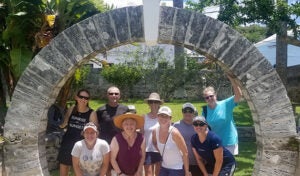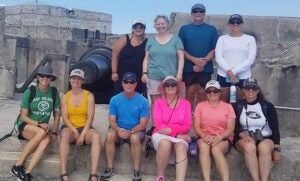Educating the Educators

Last month, a group of nine educators—led by Ed Argenta—participated in the 2019 Educators Workshop at BIOS. This annual program gives educators from the United States and Canada the opportunity to learn about a variety of topics and engage with scientific faculty and staff. Although it changes slightly every year, the core curriculum includes a professional development component, showcases what the Institute has to offer in terms of research and education, and addresses all of the logistics involved with bringing groups to BIOS. Photo credit: Ericka Poppell.
Having brought students to BIOS for more than 40 years, Ed Argenta—a teacher consultant with the Connecticut Geographic Alliance—was already familiar with what the Institute had to offer in terms of hands-on learning experiences. However, in 2012, a conversation with BIOS education staff, including Kaitlin Noyes, director of BIOS’s Ocean Academy, led to the idea of developing a summer course for educators.
“We thought it was time to try to expand the scope of what BIOS could offer to educators that might never have thought about bringing their classes to BIOS,” Argenta said. “For me, this was an easy sell, as I know BIOS is an amazing place to foster a love of science among middle school, high school, and undergraduate students.”
They agreed to run an educator course in 2014, but only four teachers enrolled, something Argenta attributes to poor networking. Undeterred, the team forged ahead. By the following year they had created a meaningful marine science curriculum for educators designed to enhance their knowledge on a variety of topics, including oceanography and marine science, Bermuda’s natural history, scientific tools and technology, island ecology and geology, and the history of scientific exploration. Although it changes slightly every year, the core curriculum includes a professional development component, showcases what BIOS has to offer in terms of research and education, and addresses all of the logistics involved with bringing groups to BIOS.
“The goal of the workshop is really to give educators the chance to learn how to plan and execute future educational field study courses at BIOS,” Noyes said. “Over the last three years, the workshop has evolved a bit to give educators the opportunity to engage more with the science staff and faculty at BIOS, which helps give them more insight into the topics we cover.”
Since 2014, Argenta and Noyes have hosted six cohorts of educators, with up to 14 participants each year, hailing from educational institutions across the United States and Canada. These days, having learned from their early experiences, the workshop is advertised through a variety of channels including the National Science Teachers Association and the National Marine Educators Association, as well as directly through the BIOS website and social media.
This summer, nine educators attended the BIOS Educators Workshop, which ran from June 24-29, 2019. Afterward, some of the participants shared their experiences and what initially drew them to the program.
Jennifer Burgin, engineering teacher at William Diamond Middle School (Massachusetts)
This year the Lexington Education Foundation provided funding for me and two other teachers [Whitney Factor and Valerie Franks] to attend the workshop together, as we were all thinking about life science and engineering connections for our middle school students. BIOS clearly has put together a suite of excellent learning opportunities for students in upper middle-school through college by combining on-site activities with field experiences. I believe our group will be planning a trip for about 15 students, with the main focus on life science with some history.
Whitney Factor, engineering and life sciences teacher at William Diamond Middle School (Massachusetts)
When I saw that we would learn about coral, underwater technology, and climate change, I knew this would be a great workshop. I learned so many new things while I was here that I will be able to bring back to my classroom, such as microplastics, human impacts on the environment, and the effects of climate change on the ocean. The experience was great! I learned so much from the other teachers, as well as from a week of viewing nature from the perspective of a science teacher.
Robert Ford, physics and environmental science instructor at Fairfield College Preparatory School (Connecticut)
It was great to get into the field again and learn new lessons, or get reminded of past lessons. It’s been 40 years since I took coral reef ecology in college, so a lot has changed. It was so interesting to learn about the glider technology and our excursion to Nonsuch Island was a rare treat. After the workshop I feel confident using Bermuda as a good example for many of the topics we cover in environmental science.
Valerie Franks, science administrator for Lexington Public Schools (Massachusetts)
I’ve been getting announcements about the workshop for years and have wanted to participate for some time. This year the glider technology caught my interest and I was lucky to see some of the latest technology used to collect marine data. The workshop itself was fabulous! Every day was a new learning experience. Connecting with other educators and learning from each other was definitely a highlight. I’m looking forward to involving my students in the MARINE ROV program and letting them build their own underwater robots.

Over the course of six days, the educators participated in a variety of activities, including a native plant restoration and marine microplastics study at Cooper’s Island, a plankton tow and identification lab, a visit to historic Fort St. Catherine, and a kayaking trip around Castle Harbor. In the evenings, BIOS scientists gave presentations and led discussions that gave educators insight into the types of research taking place at BIOS and the techniques and technologies that scientists employ to learn more about the marine environment. Photo credit: Ericka Poppell.
Mallory Gutek, high school teacher at the Carrollton School of the Sacred Heart (Florida)
For the past three years, I’ve been looking for a field trip for my marine science students that would teach them about techniques in field research and provide exposure to another marine ecosystem beyond south Florida and the Keys. I was drawn to the way BIOS structures their trips, which allows the program to blend the involvement of BIOS staff and scientists with the independence and guidance of the teacher. It was exciting to see a program that offered so much flexibility for the teacher, but also had the resources and support available that we were looking for.
Jennifer Kling, undergraduate instructor in oceanography and geology at Howard Community College (Maryland)
I’ve been bringing groups to BIOS for almost seven years but our program needed to be revamped. This summer we took a break from bringing students and instead I attended the workshop to experience some labs and locations I had not visited before in order to update our program to better fit the students who have been participating from our school. The workshop was wonderful because you hear ideas for all different topics and grade levels and I now have an entirely new itinerary for our program next year. I can’t wait!
Ericka Poppell, undergraduate instructor in biological science at the University of New England (Maine) and the Central Maine Community College
There are so many wonderful opportunities for students offered through BIOS. Due to the unique nature of Bermuda, the island provides a great model system to better understand particular global issues and the effects of climate change. I was so impressed with the list of lecture and lab topics, as well as the application of those topics in the field. I know that if I bring community college students to participate in a STEM-related field course through BIOS, they will feel comfortable navigating this institution and all it has to offer. We are already in the approval phases with our administration, so we’re very excited for a possible 2020 trip!
